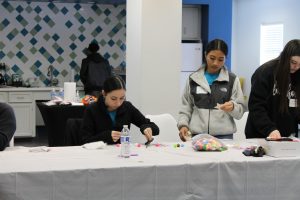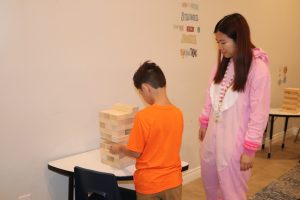We hope everyone had a great time back at school! The transition back to school can be a time of excitement and anticipation, but for autistic individuals and their families, it often comes with unique challenges. New routines, sensory overloads, social pressures, and academic demands can all contribute to increased anxiety and stress. As parents, guardians, or caregivers, understanding these potential hurdles and proactive planning can make a significant difference in fostering a positive and successful school year.
Preparing for the Transition
Starting early with preparations can significantly ease the transition.
Establish a Routine
- Practice the school day schedule: Begin simulating the school day routine a few weeks before school starts – include waking up at school-day hours, having meals at the usual times, and practicing the commute to school if applicable.
- Visual schedules: Create a visual schedule outlining the daily school routine. By doing so, it can help reduce anxiety by providing a precise, predictable sequence of events. Use pictures or symbols alongside text for younger children or those who prefer visual cues.
Sensory Considerations
- Identify potential triggers: Talk with your loved one about what aspects of school might be overwhelming from a sensory perspective (e.g., loud noises, bright lights, crowded hallways, specific textures of clothing).
- Sensory toolkit: Prepare a small bag with items that can help regulate sensory input, such as noise-canceling headphones, fidget toys, or a comforting blanket. Where and when these items can be used should be discussed with school personnel.
- Comfortable clothing: Ensure your autistic loved one has comfortable, sensory-friendly clothing that minimizes discomfort throughout the day.
 Communication and Social Skills
Communication and Social Skills
- Social stories: Use social stories to introduce new social situations or expectations that might arise at school, such as meeting new teachers, making friends, or participating in group activities.
- Role-playing: Practice social interactions through role-playing that can help build confidence and prepare for various scenarios they might encounter.
- Communication plan: Establish a clear communication plan with the school. Determine who to contact for different issues (teachers, therapists, administrators) and how often you will communicate.
Partnering with the School
Effective collaboration with the school is paramount to your loved one’s success.
Share Information
- Provide a profile: Create a brief, informative profile about your autistic loved one to share with teachers and support staff. Include information about their strengths, interests, preferences, triggers, effective calming strategies, and communication styles.
- Highlight successful strategies: Share any strategies that have worked well at home or in previous educational settings. To include specific teaching methods, sensory accommodations, or behavioral support techniques.
Advocate for Needs
- Individualized Education Program (IEP) or 504 Plan: If your loved one has an IEP or 504 plan, review it thoroughly before the school year begins. Ensure all accommodations and goals are current and appropriate. Schedule a meeting with the school team to discuss any necessary adjustments.
- Accommodations: Discuss specific accommodations that can support your loved one in the classroom and during transitions. These might include preferential seating, extended time for assignments, breaks, or access to a quiet space.
- Behavioral support plan: If applicable, ensure a positive behavior support plan is in place that addresses any challenging behaviors proactively and constructively.
Build Relationships
- Meet the team: Arrange to meet your loved one’s teachers, therapists, and any other relevant support staff before the school year starts, or soon after – communication is key and can help build rapport and ensure everyone is on the same page.
- Regular check-ins: Schedule regular check-ins with the school team to monitor progress, address any emerging concerns, and celebrate successes.
 Supporting Well-being at Home
Supporting Well-being at Home
The support you provide at home is just as crucial as the support provided at school.
Create a Calming Environment
- Designate a safe space: Ensure your loved one has a designated “safe space” at home where they can decompress and regulate after school – a space should be free from excessive sensory input and stocked with comforting items.
- Structured downtime: Build structured downtime into the after-school routine to allow for relaxation and processing before engaging in other activities or homework.
Prioritize Self-Care
- Adequate sleep: Establish a consistent sleep schedule to ensure your loved one is well-rested. Lack of sleep can exacerbate sensory sensitivities and anxiety.
- Healthy diet and exercise: Encourage a balanced diet and regular physical activity, as these contribute to overall well-being and stress management.
Celebrate Progress
- Acknowledge effort: Recognize and celebrate every effort and achievement, no matter how small. Positive reinforcement can boost confidence and motivation.
- Focus on strengths: Emphasize your loved one’s strengths and interests to help foster a positive self-image, which can be a source of resilience during challenging times.
Going back to school can be a complex journey for any child or young adult, but more often for autistic individuals. With careful planning, open communication, and unwavering support, it can also be a time of immense growth and learning. By working together with your loved one and the school, you can help pave the way for a successful and fulfilling academic year.
For autism resources and information on networking with parents and caregivers, family fun events, and more, visit www.hopeforthree.org/resources
 Communication and Social Skills
Communication and Social Skills Supporting Well-being at Home
Supporting Well-being at Home

